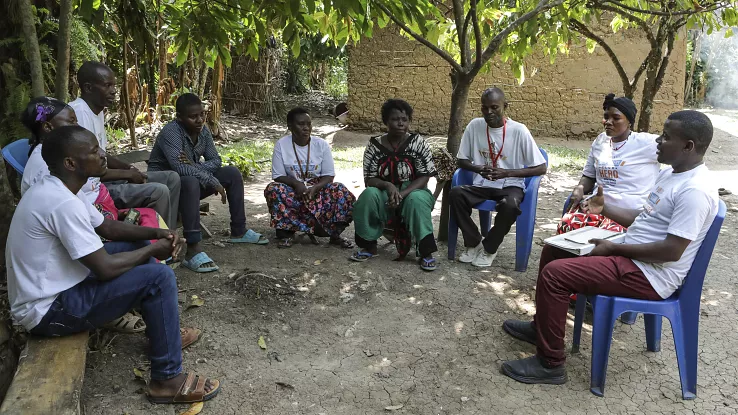A non-profit group in rural Uganda is highlighting the issue of domestic violence through education and conflict resolution.
Local non-profit Ourganda says domestic violence is so widespread that it’s hard to find a woman who isn’t affected.
The organisation, which is affiliated with the Seventh-day Adventist Church, has launched a campaign to educate communities.
It recently staged a performance to highlight the crisis in Bundibugyo district, 400 kilometres (248 miles) from the capital of Kampala.
Villagers looked on as a man pretended to be a drunken husband.
They watched him kick a pot off a fireplace, demand his dinner and then reach for a piece of firewood to strike his wife in rage.
Ourganda aimed for the staged scene to draw attention to the all-too-common real-life problem of domestic violence in Uganda.
Breaking the cycle
The organization’s women’s leader Esther Birungi explains that alcohol abuse was a severe problem in the community.
Violence was also often linked to a vicious cycle of poverty that deprives people of the basic requirements for life, including food, clothing and shelter.
And frequently, violence was linked to allegations of infidelity, according to Pamela Grace Adong, the district’s probation and social welfare officer.
Last year, she dealt with a case in which a man murdered his wife due to suspected adultery, something which is becoming common.
In 2020, the Uganda Bureau of Statistics carried out a survey with backing from the United Nations.
It found that 95% of women and girls had experienced physical or sexual violence, or both, after turning 15.
Normalisation of domestic violence
Ourganda said it was compelled to act in 2022 when it encountered a woman and her child who had been attacked by her drunken partner.
The child’s head had swollen, and his mother worried that he might die.
Ourganda led efforts to prosecute the offender, who was jailed for six months and is now on peaceful terms with his wife.
That case, a rare prosecution of a man accused of terrorizing his household, energised the villagers in Sara-Kihombya.
And it sparked Ourganda’s campaign to fight what it saw as the normalisation of domestic violence.
At the time, 47 of 50 women it surveyed in Bundibugyo said they had experienced violence in the previous week.
Thomas Balikigamba is a former perpetrator of domestic violence.
The 25-year-old told The Associated Press about the day he almost killed his only son after drinking and using drugs.
He said he was reprimanded for what he did and now realises that alcohol is “the cause of all evil”.
Conflict resolution
Ourganda also works to offer education and support regarding conflict resolution.
They provide so-called “reconciliation forms”, which accused perpetrators of domestic violence are asked to sign.
On these forms, they pledge to never to commit another such offense.
The documents aim to prevent an escalation that might lead to the police’s involvement.
But they also provide evidence for possible prosecution if the agreement is ever breached.
In addition, Ourganda runs “Mankind” programs for local men, who respond as quickly as possible to outbreaks of violence.
“Soul Sisters”
There are also “Soul Sisters” clubs, which bring together women to counsel victims and offer them shelter or clothing if they have to leave their homes.
Linda Kabugho is a member of one of the “Soul Sister” clubs.
The 23-year-old says she and her husband used to fight often after he came home having lost soccer bets.
She received support from Ourganda after she reached out to local officials following an incident in which her husband abused her.
He was angry because he felt she had failed to open the door fast enough to let him in.
Kabugho’s husband was warned that he risked jail if he beat his wife again and she says he had not raised his hands against her in many months.
She adds that helping women in similar situations was her motivation for joining the club.
Bundibugyo district
Ourganda has taken its campaign to 10 of the hundreds of villages in the Bundibugyo district, home to around 20,000 people.
The district lies on the border of the Democratic Republic of Congo, and is home to thousands of displaced people who have fled the ongoing conflict there.
Ourganda acknowledges that its efforts alone will not be enough to eradicate domestic violence in the region.
Most cases are never prosecuted.
There were 2,194 cases of teenage pregnancy in 2023 – a broad category that encompasses some forms of domestic violence.
Only 54 were reported to the police in Bundibugyo, according to Adong.
